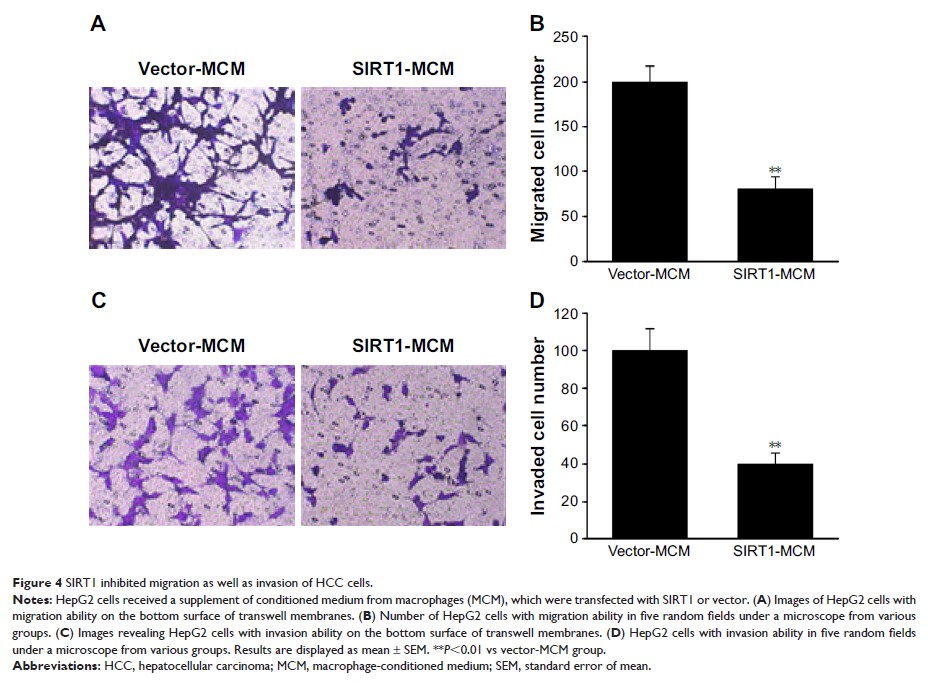9 7 8 1 6
论文已发表
注册即可获取德孚的最新动态
IF 收录期刊
- 3.3 Breast Cancer (Dove Med Press)
- 3.4 Clin Epidemiol
- 2.5 Cancer Manag Res
- 2.9 Infect Drug Resist
- 3.5 Clin Interv Aging
- 4.7 Drug Des Dev Ther
- 2.7 Int J Chronic Obstr
- 6.6 Int J Nanomed
- 2.5 Int J Women's Health
- 2.5 Neuropsych Dis Treat
- 2.7 OncoTargets Ther
- 2.0 Patient Prefer Adher
- 2.3 Ther Clin Risk Manag
- 2.5 J Pain Res
- 2.8 Diabet Metab Synd Ob
- 2.8 Psychol Res Behav Ma
- 3.0 Nat Sci Sleep
- 1.8 Pharmgenomics Pers Med
- 2.7 Risk Manag Healthc Policy
- 4.2 J Inflamm Res
- 2.1 Int J Gen Med
- 4.2 J Hepatocell Carcinoma
- 3.7 J Asthma Allergy
- 1.9 Clin Cosmet Investig Dermatol
- 2.7 J Multidiscip Healthc

SIRT1 通过 NF-κB 途径促进 M1 巨噬细胞极化来抑制肝细胞癌转移
Authors Zhou B, Yang Y, Li C
Received 19 November 2018
Accepted for publication 1 February 2019
Published 4 April 2019 Volume 2019:12 Pages 2519—2529
DOI https://doi.org/10.2147/OTT.S195234
Checked for plagiarism Yes
Review by Single-blind
Peer reviewers approved by Dr Cristina Weinberg
Peer reviewer comments 3
Editor who approved publication: Dr William Cho
Background: Tumor-associated
macrophages (TAMs) serve as crucial modulators of the complicated interaction
between cancer cells and immune microenvironment. Sirtuin 1 (SIRT1) has an
impact on immune reactions in cancer progression. Current knowledge of the role
of SIRT1 in the regulation of M1-like macrophages as well as in hepatocellular
carcinoma (HCC) is insufficient.
Methods: SIRT1
expression in HCC tissues was detected using quantitative reverse transcriptase
PCR (qRT-PCR) and Western blot. M1 markers were detected by qRT-PCR and flow
cytometry assay. Moreover, the influence of SIRT1 on HCC cell apoptosis,
migration, and invasion was studied using transwell assay, flow cytometry
assay, and TUNEL assays, respectively.
Results: In this
study, it was revealed that SIRT1 was upregulated in patients suffering from
HCC; these patients were also shown to have elevated levels of M1-like TAM
infiltration. SIRT1 was able to reinforce M1-like macrophage infiltration and
inhibit HCC metastasis. Furthermore, SIRT1 enhanced NF-κB stimulation,
promoting phosphorylation of p65, IκB, and IκB kinase. It was further
demonstrated in our study that SIRT1 had an impact on polarization of M1
through the NF-κB pathway. NF-κB repression downregulated M1 markers in
macrophages, which excessively expressed SIRT1 and counteracted the influence
of SIRT1 on migration of HCC cells.
Conclusion: Taken
together, these results offer proof that SIRT1 is an essential regulator of the
immune reaction that counteracts malignant HCC cell migration as well as
growth, indicating that macrophage SIRT1 could serve as an innovative target to
treat HCC.
Keywords: SIRT1,
M1-like macrophages, hepatocellular carcinoma, cell migration, NF-κB pathway
